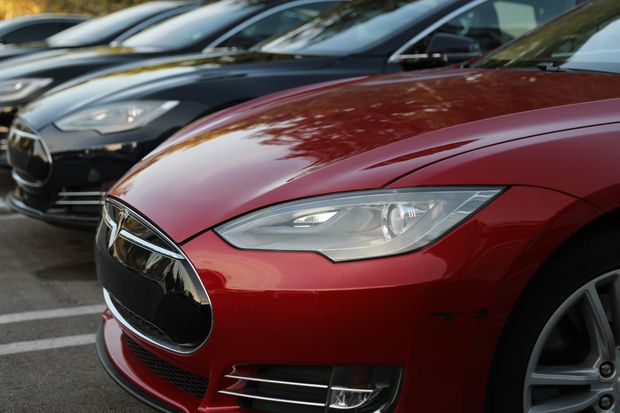
Tesla was buoyed by $397 million in regulatory credits in the third quarter.
Getty Images
Tesla Inc. Chief Executive Elon Musk called the electric-car maker’s third quarter its best ever, but it still isn’t selling its cars for a profit, while dropping its prices.
Tesla reported its fifth consecutive quarter of profits, but it was also the fourth consecutive quarter that Tesla would not have been profitable without regulatory credit sales. Tesla was buoyed by $397 million in regulatory credits in the third quarter, which helped paper over the effects of a large stock bonus for Musk and produce $331 million in profit.
“Once again, auto regulatory credit revenue was another major driver of the beat,” wrote Garrett Nelson, an analyst with CFRA, in a brief note to clients.
Tesla TSLA, +0.16% sells regulatory credits to other auto makers who fail to manufacture enough “green” cars to meet federal standards, and they have been selling a lot of them this year. Tesla has collected $1.18 billion in credit sales — with their 100% profit margins — through the past nine months, more than double what it booked in all of 2019.
It is not clear how long Tesla will be such a hot ticket for those credits, however — development of rival electric cars could soon mean fewer customers as large auto makers and startups start collecting their own credits. In its most recent 10Q filing, Tesla disclosed that it has earned and will continue to earn various tradable automotive regulatory credits. “We have sold these credits, and will continue to sell future credits, to automotive companies and other regulated entities who can use the credits to comply with emission standards and other regulatory requirements,” Tesla said.
In its conference call last quarter, Tesla Chief Financial Officer Zachary Kirkhorn told analysts that the company’s regulatory credit revenue in 2020 would “roughly double” that of 2019. Already in the first nine months of this year, Tesla’s regulatory credits have totaled $1.179 billion, compared with $594 million for the full year of 2019. Tesla has already hit Kirkhorn’s guidance on credit revenue, adding another element of possible uncertainty for the fourth quarter.
Musk could sell more cars at higher prices to generate more cash, but he seems determined not to. After dropping the price of the luxury Model S twice, last to a juvenile price of $69,420, Musk again on Wednesday discussed bringing prices down overall.
“If the car is too expensive, than people won’t have enough money in their bank account, they can’t buy it no matter what the value proposition,” Musk said. “It is important to lower prices so people can literally just have enough money to buy it.”
Tesla shares have soared a stunning 404% this year, for a valuation approaching $400 billion, as its shares rose in after-hours trading Wednesday. To produce anywhere near enough profit to deserve that valuation, Tesla must stop relying on regulatory credits to produce profit, and cutting prices isn’t going to help.











